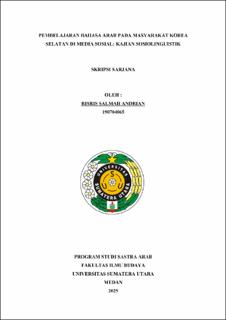| dc.description.abstract | This study discusses the learning of Arabic by South Korean society through social media using a sociolinguistic approach. The aim of this research is to analyze the Arabic language learning competencies demonstrated in the digital interactions of South Korean users on the YouTube platform, based on the Language Learning Competence theory by Warsiman (2014). This research is a qualitative study employing netnographic and content analysis methods (Addeo et all, 2020). Data were collected through observation, note-taking, and recording techniques on the comments from five videos across three YouTube channels: RAFIQ TV, Kim Micha, and JannahKorea. The results of the study revealed six types of competencies found in the learning-related comments: 12 comments indicating participative competence, 5 indicating interactional competence, 2 indicating academic competence, 5 indicating grammatical competence, 5 indicating sociolinguistic competence, and 2 indicating discourse competence. No comments were found to reflect strategic competence. It can be concluded that Arabic language learning through social media among South Korean society reflects a diverse and constructive development of sociolinguistic competencies within the context of digital interaction. | en_US |


